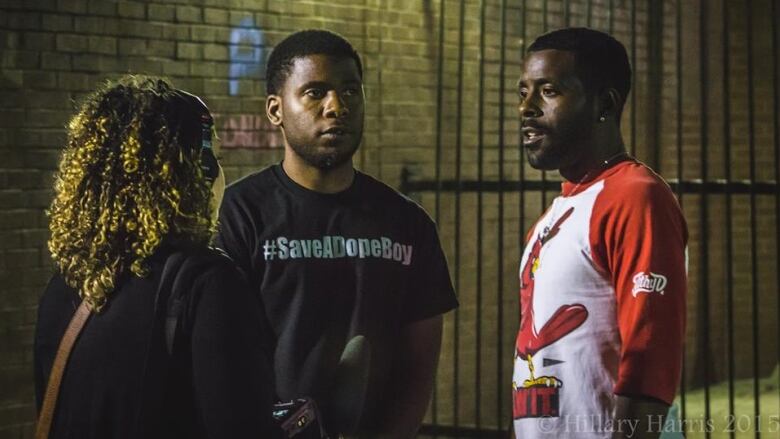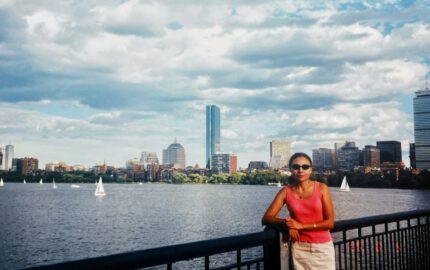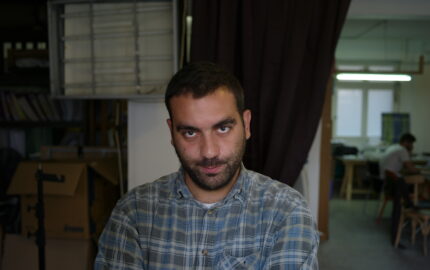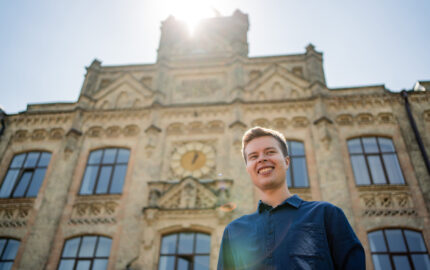“I am at home everywhere, and nowhere. I am never a stranger and I never quite belong.”
That quote by Belgian writer Georges Simenon hung above my 10th grade English teacher’s desk when I was in high school in Dubai, U.A.E.
I felt like it was describing my entire life.
I was 14 at the time. By then, I had spent my whole childhood on the move: from my birthplace in Alexandria, Egypt, to Toronto, Canada; then to Saudi Arabia where we hopped cities from Jeddah, Riyadh, to Dhahran; then to Dubai for the beginning of high school. That school where the quote hung was the fourth one I had moved to in five years.
The “at home everywhere and nowhere” theme has followed me through most of my life. And, in large part, it’s this sentiment that pushed me toward journalism.
As an Egyptian-Canadian, Muslim, Arabic-, English- and French-speaking girl, I knew that the media had often not done right by many of the communities I came from, and I felt I could rectify that by being a journalist. I didn’t realize how heavy that weight would be — and the barriers I’d run into in trying to do so.
For 10 years, I was a journalist at the Canadian Broadcasting Corporation. Though I started in TV, I spent eight years at the CBC in radio, where I worked on a national, award-winning daily show called The Current, which aired to 2.5 million listeners a week. I was fueled to put people on this show that had never been on. I used to keep a list of all the new voices that I pitched and produced and put on.
By all accounts, I was doing well. I rose to the rank of producer and was often asked to fill in as senior producer. But when I applied for the role formally, I was told I needed more training. I was qualified to lead temporarily, as a stopgap measure, but not fully. I wondered why.
I also knew I had to be careful. I felt like every day was like walking a tightrope, especially when discussing stories about race, racism, and police brutality. Often, in those cases, the room fell silent, and people stopped meeting my eyes. Then it was death by a thousand questions: There were many times I felt I had to prove racism existed in the context of stories I brought forward. There was another dynamic that was playing out. I was depended on to be an “expert” or sensitivity reader for a wide range of issues.
I internalized so much of that pressure. To many people, my presence was a check mark for diversity. But I thought, how much more rich and textured and complex would our work be if there were three of me? I felt the weight of being the only one in the room.
Being the only one in the room often came with pushing back on editorial decisions that were rooted in deeply entrenched power dynamics, specifically ones about race, policing, and use of force. And I would soon learn that pushing back enough times would cost me.
The first time I distinctly remember pushing back on an editorial decision was in 2015. I had just come back from a reporting assignment in Baltimore where I had gone to make a radio documentary about police brutality in the wake of Freddie Gray’s death after a “rough ride” in the back of a Baltimore Police van, and how his death set the city alight with protests.
After my first night in Baltimore, I was heading home at curfew when a young man stopped to talk to me. I asked him his name (it was Lonnie Moore), turned on my mic, and asked him one question: How many Freddie Grays are there in this neighborhood?
Lonnie described what life as a young Black man in Baltimore was like — from being called the n-word, being stopped for no apparent reason by police, and the heartbreak of watching injustices towards Black people happen over and over until it boiled over into a whole city in protest.
As our conversation started, another young man joined us. I asked him his name and began to write it down in my notebook as I spelled it out to him to make sure I got it right: “J-A-R-E-,” I said.
“No,” he said. “J-A-R-R-O-D. Jones.”
What followed was a 45-minute duet in which these two men, strangers to each other, were completing each other’s sentences, mirroring each other’s accounts of being mistreated, profiled, and harassed by police for being Black in Baltimore.
Minutes after that interview ended, it was past curfew, and police descended into that intersection, forcibly clearing it out. We tried to exit so many ways but were boxed in by officer after officer telling us to leave another way. We were trapped. Soon, a policeman came swinging at Jarrod with his baton, calling him names, including the n-word, and swearing at him. We both ran.
When I got home to Toronto, I wanted to air the powerful conversation between Lonnie and Jarrod. But my executive producer didn’t want to run it. First, she questioned if the men had given me their real names. It was a question that didn’t sit well with me, implying that not only did she not believe what they described, she didn’t even trust that they were who they said they were. I told her the story of Jarrod correcting the spelling of his name.
Then, she questioned if I had called Baltimore Police to get their response. I had — I also called the police union — but no one responded. In the end, she said the piece wouldn’t run. She lectured me about the importance of accuracy, transparency, and accountability, as if I had somehow failed to uphold these core values. I went back to my desk deflated. An older white male colleague saw my face and asked what happened. When I told him, he intervened on my behalf, talking with the executive producer who eventually relented. The interview aired.
Over the course of my time at the CBC, many other journalists and I fought thousands of small, everyday battles like that one. In 2018, a co-producer and I had to fight to keep a segment on racism in health care from being axed from a show we were producing when a panel of Indigenous nurses described seeing Indigenous patients being treated more harshly and violently than their non-Indigenous counterparts. The year before, I produced an interview with Emmy-award nominated journalist Ahmed Shihab Eldin about protests that were unfolding in Jerusalem and how he had been harassed by Israeli Security Forces while he was reporting. That interview was axed with no explanation as to why.
In 2019, a position outside of the CBC beckoned to me, and seeing that I had been consistently passed over for more senior roles, I took it. Shortly after I left the CBC, I found out that the reason I hadn’t been promoted is because a manager saw me as “biased” after the Ahmed Shihab Eldin story and not capable of leading a show.
A year later, George Floyd was murdered by a Minneapolis police officer while a terrified Black girl looked on and filmed it on her cell phone. That video would launch what many call a new civil rights movement against anti-Black racism and police brutality. George Floyd’s murder unleashed a visceral public reckoning about racism in every industry, including journalism. It reminded me of some of my experiences at the CBC.
I thought about how all these experiences were not unique to me. They were happening to many other racialized journalists whose integrity, professionalism, and ethics are regularly called into question when they report on their own communities and push back on police narratives.
In the summer of 2020, I poured my long-boiling frustration into an essay for The Walrus, “Objectivity Is A Privilege Afforded to White Journalists.” It was about my personal experience, but it was more of a critique of objectivity and how falling outside of its accepted “lines” was especially punishing for Black, Indigenous, and other racialized journalists.
It took four months to pitch and publish my piece, and I was terrified it would cost me my job and future in the industry for daring to call out an institution like the CBC.
My piece went live that August. As soon as it was published, I sat there and waited for my career to implode.
Instead, I watched the article go viral and earn a gold medal at the National Magazine Awards that year. I was invited to guest lecture at journalism schools across Canada and U.S. I got notes from journalists across the globe, saying they saw themselves mirrored in my experiences.
I spent my fellowship looking for ways to go beyond surface level diversity talk and create newsrooms that truly reflect the world outside of them, with Black, Indigenous, and racialized people in upper echelons of power — not just as surface level window-dressing.
My Nieman year gave me the confidence, boldness, and support I needed to continue in this work. And so much of the work begins with how we teach journalism. I spent the summer teaching journalism to high school students at Boston University’s Summer Journalism Academy, where had conversations about objectivity and fair sourcing. I also taught feature writing at Harvard, where I talked about my own essay at the Walrus.
Writing the hard truths about journalism had me worried I’d never see another day in the industry, but instead, it opened the door for me to be part of shaping its future by educating the next generation of journalists. It’s one of the best ways to make sure that our industry can keep producing the kind of journalism that will bend us towards a more just future.




